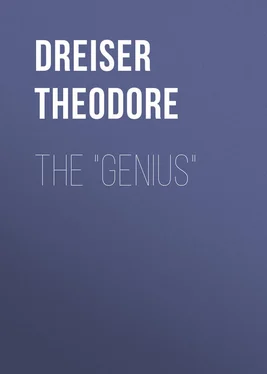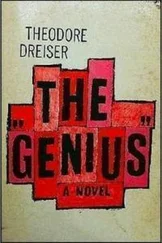Theodore Dreiser - The Genius
Здесь есть возможность читать онлайн «Theodore Dreiser - The Genius» — ознакомительный отрывок электронной книги совершенно бесплатно, а после прочтения отрывка купить полную версию. В некоторых случаях можно слушать аудио, скачать через торрент в формате fb2 и присутствует краткое содержание. Жанр: foreign_antique, foreign_prose, на английском языке. Описание произведения, (предисловие) а так же отзывы посетителей доступны на портале библиотеки ЛибКат.
- Название:The Genius
- Автор:
- Жанр:
- Год:неизвестен
- ISBN:нет данных
- Рейтинг книги:5 / 5. Голосов: 1
-
Избранное:Добавить в избранное
- Отзывы:
-
Ваша оценка:
- 100
- 1
- 2
- 3
- 4
- 5
The Genius: краткое содержание, описание и аннотация
Предлагаем к чтению аннотацию, описание, краткое содержание или предисловие (зависит от того, что написал сам автор книги «The Genius»). Если вы не нашли необходимую информацию о книге — напишите в комментариях, мы постараемся отыскать её.
The Genius — читать онлайн ознакомительный отрывок
Ниже представлен текст книги, разбитый по страницам. Система сохранения места последней прочитанной страницы, позволяет с удобством читать онлайн бесплатно книгу «The Genius», без необходимости каждый раз заново искать на чём Вы остановились. Поставьте закладку, и сможете в любой момент перейти на страницу, на которой закончили чтение.
Интервал:
Закладка:
She came shortly after his art school opened, and at her invitation he went out to the residence of her aunt on the North Side, a nice, pleasant brick house in a quiet side street, which had all the airs of middle class peace and comfort. He was impressed with what seemed to him a sweet, conservative atmosphere – a fitting domicile for a girl so dainty and refined as Angela. He paid his respects early Saturday morning because her neighborhood happened to be in the direction of his work.
She played for him – better than anyone he had ever known. It seemed to him a great accomplishment. Her temperament attracted her to music of a high emotional order and to songs and instrumental compositions of indefinable sweetness. In the half hour he stayed she played several things, and he noted with a new pleasure her small shapely body in a dress of a very simple, close fitting design; her hair hung in two great braids far below her waist. She reminded him the least bit of Marguerite in "Faust."
He went again in the evening, shining and eager, and arrayed in his best. He was full of the sense of his art prospects, and happy to see her again, for he was satisfied that he was going to fall in love with her. She had a strong, sympathetic attitude which allured him. She wanted to be nice to this youth – wanted him to like her – and so the atmosphere was right.
That evening he took her to the Chicago Opera House, where there was playing an extravaganza. This fantasy, so beautiful in its stage-craft, so gorgeous in its show of costumes and pretty girls, so idle in its humor and sweet in its love songs, captivated both Eugene and Angela. Neither had been to a theatre for a long time; both were en rapport with some such fantastic interpretation of existence. After the short acquaintance at Alexandria it was a nice coming together. It gave point to their reunion.
After the performance he guided her through the surging crowds to a North Division Street car – they had laid cables since his arrival – and together they went over the beauties and humor of the thing they had seen. He asked permission to call again next day, and at the end of an afternoon in her company, proposed that they go to hear a famous preacher who was speaking in Central Music Hall evenings.
Angela was pleased at Eugene's resourcefulness. She wanted to be with him; this was a good excuse. They went early and enjoyed it. Eugene liked the sermon as an expression of youth and beauty and power to command. He would have liked to be an orator like that, and he told Angela so. And he confided more and more of himself to her. She was impressed by his vivid interest in life, his selective power, and felt that he was destined to be a notable personality.
There were other meetings. She came again in early November and before Christmas and Eugene was fast becoming lost in the meshes of her hair. Although he met Ruby in November and took up a tentative relation on a less spiritual basis – as he would have said at the time – he nevertheless held this acquaintanceship with Angela in the background as a superior and more significant thing. She was purer than Ruby; there was in her certainly a deeper vein of feeling, as expressed in her thoughts and music. Moreover she represented a country home, something like his own, a nice simple country town, nice people. Why should he part with her, or ever let her know anything of this other world that he touched? He did not think he ought to. He was afraid that he would lose her, and he knew that she would make any man an ideal wife. She came again in December and he almost proposed to her – he must not be free with her or draw too near too rapidly. She made him feel the sacredness of love and marriage. And he did propose in January.
The artist is a blend of subtleties in emotion which can not be classified. No one woman could have satisfied all sides of Eugene's character at that time. Beauty was the point with him. Any girl who was young, emotional or sympathetic to the right degree and beautiful would have attracted and held him for a while. He loved beauty – not a plan of life. He was interested in an artistic career, not in the founding of a family. Girlhood – the beauty of youth – was artistic, hence he craved it.
Angela's mental and emotional composition was stable. She had learned to believe from childhood that marriage was a fixed thing. She believed in one life and one love. When you found that, every other relationship which did not minister to it was ended. If children came, very good; if not, very good; marriage was permanent anyhow. And if you did not marry happily it was nevertheless your duty to endure and suffer for whatever good might remain. You might suffer badly in such a union, but it was dangerous and disgraceful to break it. If you could not stand it any more, your life was a failure.
Of course, Eugene did not know what he was trifling with. He had no conception of the nature of the relationship he was building up. He went on blindly dreaming of this girl as an ideal, and anticipating eventual marriage with her. When that would be, he had no idea, for though his salary had been raised at Christmas he was getting only eighteen dollars a week; but he deemed it would come within a reasonable time.
Meanwhile, his visits to Ruby had brought the inevitable result. The very nature of the situation seemed to compel it. She was young, brimming over with a love of adventure, admiring youth and strength in men. Eugene, with his pale face, which had just a touch of melancholy about it, his sex magnetism, his love of beauty, appealed to her. Uncurbed passion was perhaps uppermost to begin with; very shortly it was confounded with affection, for this girl could love. She was sweet, good natured, ignorant of life from many points of view. Eugene represented the most dramatic imagination she had yet seen. She described to him the character of her foster parents, told how simple they were and how she could do about as she pleased. They did not know that she posed in the nude. She confided to him her particular friendship for certain artists, denying any present intimacies. She admitted them in the past, but asserted that they were bygones. Eugene really did not believe this. He suspected her of meeting other approaches in the spirit in which she had met his own. It aroused his jealousy, and he wished at once that she were not a model. He said as much and she laughed. She knew he would act like that, it was the first proof of real, definite interest in her on his part.
From that time on there were lovely days and evenings spent in her company. Before the dinner she invited him over to breakfast one Sunday. Her foster parents were to be away and she was to have the house to herself. She wanted to cook Eugene a breakfast – principally to show him she could cook – and then it was novel. She waited till he arrived at nine to begin operations and then, arrayed in a neat little lavender, close fitting house dress, and a ruffled white apron, went about her work, setting the table, making biscuit, preparing a kidney ragout with strong wine, and making coffee.
Eugene was delighted. He followed her about, delaying her work by taking her in his arms and kissing her. She got flour on her nose and he brushed it off with his lips.
It was on this occasion that she showed him a very pleasing little dance she could do – a clog dance, which had a running, side-ways motion, with frequent and rapid clicking of the heels. She gathered her skirts a little way above her ankles and twinkled her feet through a maze of motions. Eugene was beside himself with admiration. He told himself he had never met such a girl – to be so clever at posing, playing and dancing, and so young. He thought she would make a delightful creature to live with, and he wished now he had money enough to make it possible. At this high-flown moment and at some others he thought he might almost marry her.
Читать дальшеИнтервал:
Закладка:
Похожие книги на «The Genius»
Представляем Вашему вниманию похожие книги на «The Genius» списком для выбора. Мы отобрали схожую по названию и смыслу литературу в надежде предоставить читателям больше вариантов отыскать новые, интересные, ещё непрочитанные произведения.
Обсуждение, отзывы о книге «The Genius» и просто собственные мнения читателей. Оставьте ваши комментарии, напишите, что Вы думаете о произведении, его смысле или главных героях. Укажите что конкретно понравилось, а что нет, и почему Вы так считаете.








